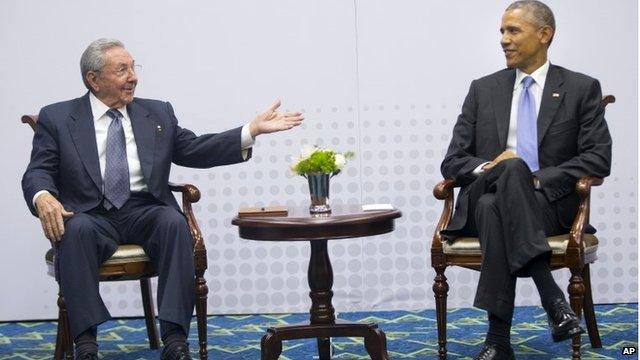Cuba: Fidel followers remain nervous of US thaw
- Published
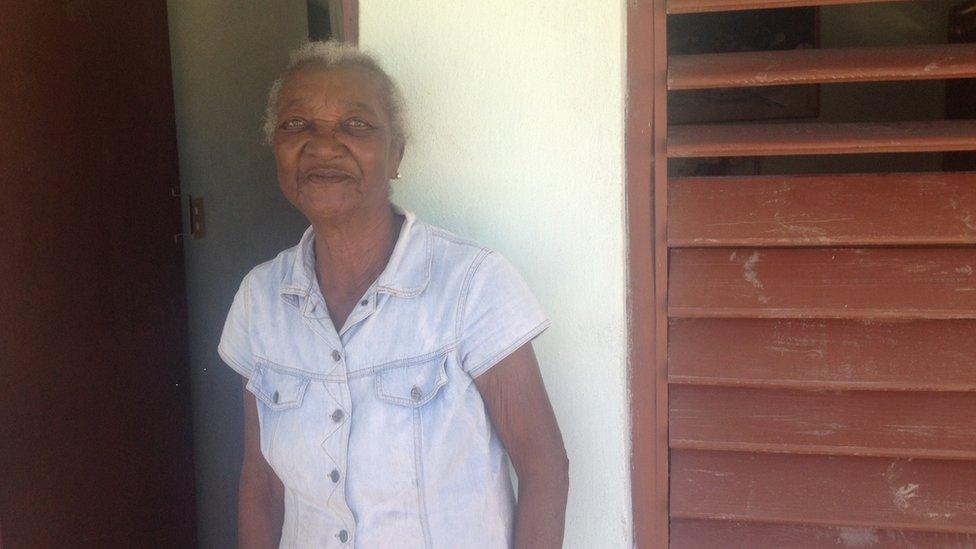
Dolores Vic Hernandez remembers the Bay of Pigs invasion
The museum at Cuba's most famous beach, the Bay of Pigs, is under renovation.
Inside, workers are busily installing new multi-media exhibits while outside a team of builders is laying the concrete patio and painting the museum entrance.
The grand reopening is set for April, which marks the 55th anniversary of the landing on the shores at Playa Giron of hundreds of CIA-trained Cuban exiles in a doomed attempt to bring down Fidel Castro and his socialist revolution.
The failed invasion was a low ebb in the US-Cuba relationship, only surpassed by the Cuban missile crisis a year later, and remains a watchword for Washington's covert intervention in Latin America.
Many of the original Cuban fighters - both militias and regular army troops - are still alive today. But in Playa Giron itself just a handful are left, and several of those are in poor health.
83-year-old Dolores Vic Hernandez might not have fought the invading forces, but she can recall in vivid detail having to escape from them, fleeing her home in the little coastal town into the surrounding hills with her sister-in-law and their children.
"We only had the clothes we were wearing and the babies were in nappies. We collected our friend who had six children and whose husband was in Havana and we took her with us to the mountains."
Dolores can't move as freely as she used to and her sight is failing, but it isn't hard to imagine how determined she must have been as a young mother trying to protect her family from the escalating conflict.
"I'm a person who's never been afraid of anything," she says with defiance as she describes entering an abandoned house to take "a little coffee and sugar, some biscuits for the children" for their journey.
Eventually of course, Fidel Castro took control of the revolutionary forces at Giron and masterminded a famous victory, one which would embarrass Washington for decades.
Obama-Castro summit caps thaw in US-Cuba relations
What is behind the US-Cuba thaw?
How does Obama get along with Latin America?
No trust
Since the thaw with the US was announced, Fidel Castro - the elder statesman of the Cuban Revolution - has only made the shortest of pronouncements about the new relationship, external:
"I don't trust in the United States' policy nor have I exchanged a word with them," he wrote in an editorial in the state-run newspaper, Granma, published a little over a year ago.
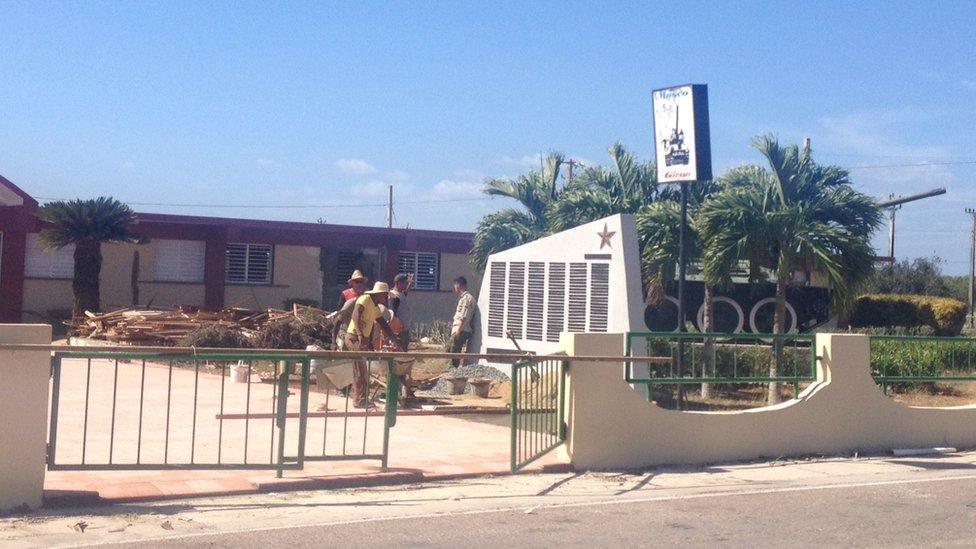
The Playa Giron museum is set to open in April
His lack of trust is not surprising, considering he survived scores of assassination attempts by the CIA during his time in power.
He continued to say that the president, his brother Raul, was taking "the pertinent steps in accordance with his prerogatives and the faculties bestowed on him by the National Assembly and the Cuban Communist Party".
To some readers, it didn't sound like a ringing endorsement.
But Cuban academic, Esteban Morales disagrees: "That didn't mean to say he doesn't support the process," argues Dr Morales who has written extensively about Cuba's relationship with the United States.
"I think Fidel is someone who's wise enough to know that this is the only possible path. What is the alternative? Stand against the US canons firing across the bow like we did in the past? No. That's why Fidel intellectually understands that this is a moment to advance."
Rather, Dr Morales believes that Castro was "alerting" the Cuban people to Washington's true motives: "Fidel knows perfectly well that international relations is a wide battlefield.
"We don't expect the United States to turn into our best friends or allies overnight, not by a long way. But perhaps in time they might become trusted neighbours."

Thaw in US-Cuba relations:
US-Cuba relations were frozen since the early 1960s, when the US broke off diplomatic relations and imposed a trade embargo after Cuba's revolution led to communism.
The embargo was estimated to cost the US economy $1.2bn a year.
US President Barack Obama announced moves to normalise diplomatic and economic ties in December 2014.
It followed more than a year of secret talks in Canada and at the Vatican, directly involving Pope Francis.
The plans included reviewing the designation of Cuba as a state sponsor of terrorism, easing a travel ban for US citizens, easing financial restrictions, increasing telecommunications links as well as efforts to lift the trade embargo.
The US reopened its embassy in Havana in August 2015, a month after Cuba reopened its embassy in Washington.

But it is not only Fidel who has his doubts.
"There are Cubans who are nervous about (the opening)," says Jon Lee Anderson of the New Yorker and author of the definitive biography of Che Guevara.
"They seem to be people who were already of a certain age when the revolution came along and this has been their life, the true believers in Fidel Castro's long project of socialism."
Their concerns for Cuba are as much social and cultural as economic and political, he argues.
"They worry about what will happen to their way of life. They worry about 'will the Miami Cubans come and buy everything and shut them out?' And they worry about the influence of capitalism in eroding their values."
But they may already be too late in that regard: "Most people in Cuba are aware that in the 25 years since the collapse of the Soviet Union and the changes that already began in Cuba, that erosion began some time ago."
Young impatient
While it might seem improbable to many of Fidel's generation that the relationship with the US could move so far so fast, the vast majority of young people in Cuba are impatient for even quicker change.
There can be little better expression of that change than President Obama walking the streets of Old Havana with his family.
He is also expected to talk to private business owners, meet dissidents and deliver a major speech during his trip, in which he intends to underline the importance of young people in shaping Cuba's future.
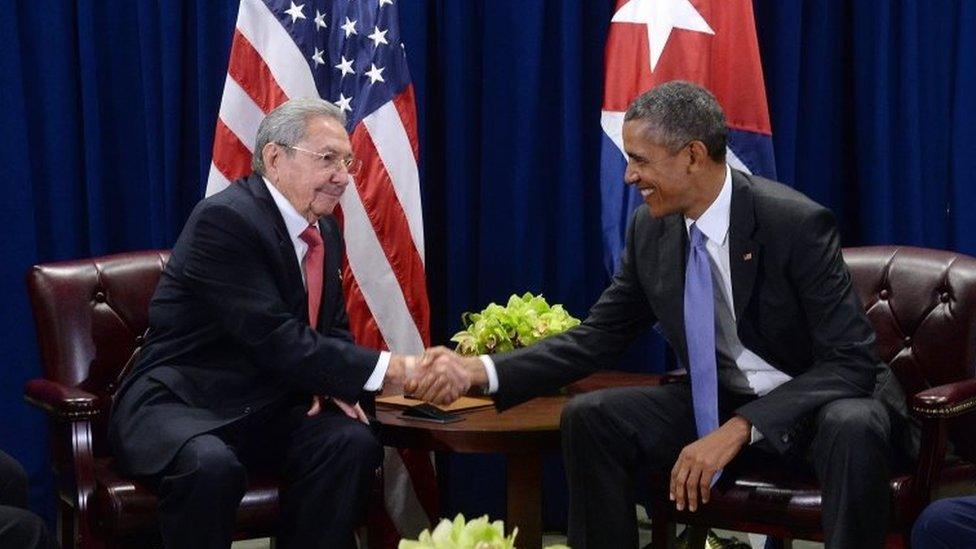
Presidents Raul Castro and Barack Obama have begun to forge a working relationship
Earlier this month in Havana, tens of thousands of young people turned out on the Malecon for a concert by the American dance music group, Major Lazer - intended to promote 'Musicabana', external, a landmark electronic music festival in Cuba later this year.
"This is the first international music band to come to Cuba at the top of their game," says Fabien Pisani, the concert organiser and director of 'Musicabana'.
"What is interesting here is that this is the music that every kid who is 12 through to 17 is listening to right now.
"So you can see the degree of excitement here, to be able to touch that and dance and sing together."
The concert was held just metres from the US embassy, in the 'Anti-Imperialist Plaza', a site previously synonymous with government-organised demonstrations against US policy.
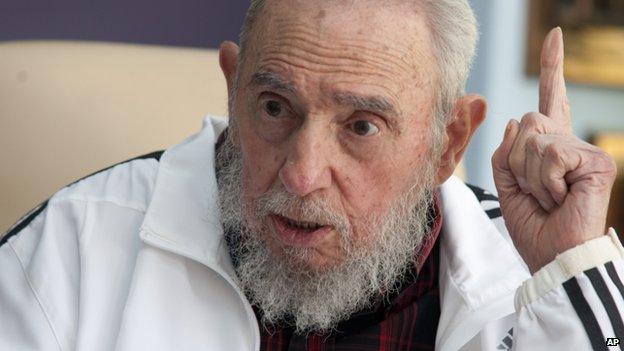
Fidel Castro remains suspicious of US intentions
On this occasion, an estimated 150,000-200,000 people turned out in the square, not to protest but to dance in the late afternoon sun.
Back in Playa Giron, Dolores Vic would happily describe herself as a "true believer" in Fidel Castro's socialist project, five-and-a-half decades after the Bay of Pigs debacle.
"Fidel is like a god to me," she says from her home in Playa Giron, before recounting how she once cooked him a traditional Cuban meal of rice and beans and chicken fricassee when he visited the region.
To an extent, Dolores shares his unease about the new relationship with the US.
"I have a few doubts as there are always a few bad people over there who'd want to harm us. But there are a lot of good ones too," she concedes.
Still, she can't help but be excited about President Obama's imminent visit.
"I never dreamt I'd see this," she says, her eyes shining.
"I never thought that in my lifetime a US president would come to Cuba."
- Published11 April 2015
